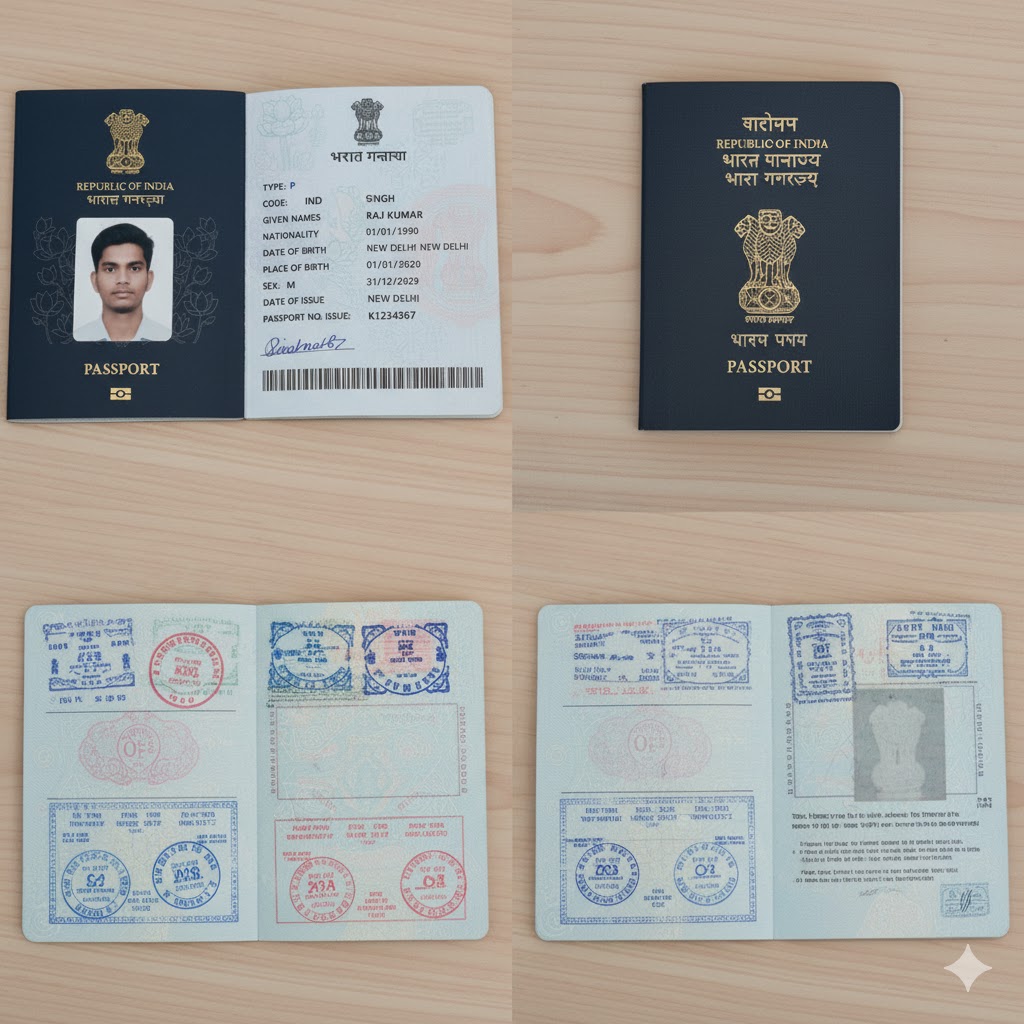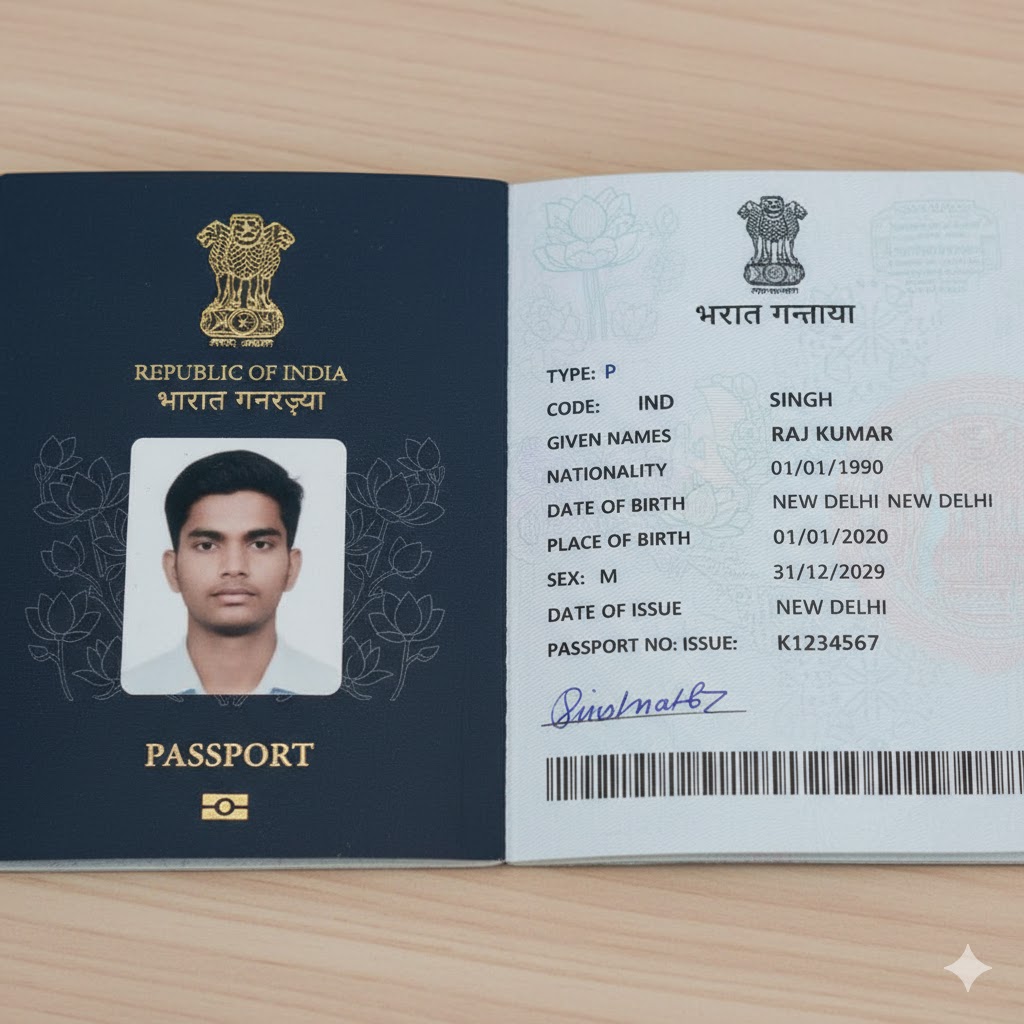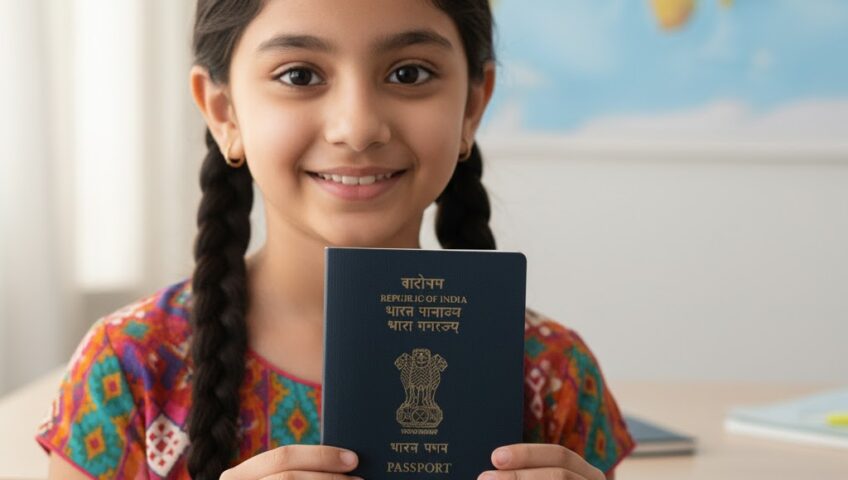✅ Key Rules for Government and PSU Employees
1. Choice of Documents: IC / NOC / Prior Intimation

Special Passport Rules for Government If you are a regular employee of the Central or State Government, a Public Sector Undertaking (PSU), or an autonomous body, you can submit one of the following documents when applying for a passport:
- Identity Certificate (IC): Special Passport Rules for Government
Issued by your controlling authority on official letterhead (as per Annexure A/B). This can allow faster passport issuance, sometimes even on a post-police-verification basis. - No Objection Certificate (NOC): Special Passport Rules for Government
Issued by your department (as per Annexure G/M). This confirms that your employer has no objection to your applying for a passport. Police verification is usually still required, but the NOC speeds up processing. - Prior Intimation Letter:
A self-declaration (Annexure H) where you inform your department in writing that you are applying for a passport. This is often accepted instead of a formal NOC.
These options are designed to simplify the process for government and PSU employees.
2. Applicability: Government/PSU vs. Private Sector : Special Passport Rules for Government
- These streamlined options mainly apply to regularly appointed employees in the government, PSUs, or autonomous bodies.
- Contractual or temporary employees may not qualify for the post-verification issuance benefits.
- For private sector employees, the same forms (like Annexure H) may be used for formality, but private employers are not required to issue IC or NOC in the prescribed government format.
- Private employees must generally undergo full police verification before passport issuance. Special Passport Rules for Government

3. Police Verification Rules : Special Passport Rules for Government
- With a valid Identity Certificate (IC) from a recognized government or PSU authority, a passport may be issued on a post-police-verification basis — meaning the passport is printed first and verification happens afterward.
- For most other employees, including private-sector workers, pre-police verification is mandatory.
- Even if a passport is issued with IC, any adverse police report later can lead to passport suspension or cancellation.
4. Format and Validity of Employer Certificates : Special Passport Rules for Government
- The IC or NOC should be on official stationery with the department seal and authorized signature.
- The Prior Intimation Letter (Annexure H) must include:
- Applicant’s name and designation
- Name and address of the employer
- Subject line “Prior Intimation for Submission of Passport Application”
- Applicant’s signature, date, and place
- These documents are typically valid for six months from the date of issue.

5. Special Rules on Vigilance and Foreign Travel : Special Passport Rules for Government
- Government and PSU employees under disciplinary or vigilance inquiry may face restrictions on passport issuance until clearance is received.
- Having an IC or NOC does not exempt you from your department’s foreign travel permission or ex-India leave rules.
- Departments may still require you to seek separate clearance before traveling abroad, even if your passport is valid.
6. Proof of Identity and Address Simplifications : Special Passport Rules for Government
For government employees:
- Proof of date of birth can be taken from an extract of the service record or official employee file.
- Address proof can be provided through a government accommodation allotment letter or similar departmental document.
These relaxations are available to regular government and PSU employees but not to private sector applicants.
📍 Special Notes for Employees in Gurugram (Gurgaon)
Since Gurgaon falls under the Regional Passport Office (RPO) Delhi, the same central rules apply. However, a few local observations are relevant:
- Applicable Authorities: Special Passport Rules for Government
Government and PSU employees in Gurgaon may get certificates from Haryana State departments, Central Government offices located in Gurugram, or PSUs operating locally (like NTPC, IOCL, or MTNL). - Verification Time: Special Passport Rules for Government
As Gurgaon falls under the NCR region, police verification can sometimes take longer due to high applicant volume. Submitting an IC can reduce overall waiting time. - Private Employees: Special Passport Rules for Government
Gurgaon being a major private-sector hub (IT, finance, manufacturing), private employees must follow the standard route — applying with ID, address, and DOB proofs — and await police verification before the passport is printed. - Internal Company Policies: Special Passport Rules for Government
Some MNCs and private organizations in Gurgaon may have internal guidelines for employees traveling abroad. These are not part of the passport process but must still be followed. - Regional Passport Office Coordination: Special Passport Rules for Government
The Gurgaon Passport Seva Kendra (PSK) coordinates with the RPO Delhi for document verification. Always carry original documents and ensure that your IC/NOC matches the required format.
📝 Practical Checklist for Government or PSU Employees in Gurgaon
- Decide the documentation route: Special Passport Rules for Government
- Identity Certificate (Annexure A/B)
- No Objection Certificate (Annexure G/M)
- Prior Intimation Letter (Annexure H)
- Check your employment status: Special Passport Rules for Government
Confirm that you are a regular employee, not temporary or contractual. - Collect required documents: Special Passport Rules for Government
Proof of identity, address, and date of birth (service record acceptable for government staff). - Apply through the Passport Seva Portal: Special Passport Rules for Government
Choose the correct PSK (usually PSK Gurgaon or PSK Herald House Delhi). - Submit documents at PSK: Special Passport Rules for Government
Present your IC/NOC/Prior Intimation along with your other proofs. - Track your application status: Special Passport Rules for Government
Monitor the status online and follow up for police verification if pending. - Comply with departmental rules: Special Passport Rules for Government
Even after receiving your passport, obtain official permission for any foreign travel as per your department’s policy.
⚠️ Common Mistakes to Avoid
- Submitting an outdated or unsigned IC/NOC.
- Using the IC route while being on a temporary or contractual appointment.
- Assuming no police verification will be done at all.
- Ignoring departmental clearance requirements for overseas travel.
- Not following up with local police for verification delays.
✅ Summary : Special Passport Rules for Government
| Category | Document Needed | Verification Type | Benefit |
|---|---|---|---|
| Central/State Govt. or PSU (Regular) | Identity Certificate / NOC / Prior Intimation | Post or Pre Police Verification | Faster processing, reduced documentation |
| Contractual Govt./PSU Employee | NOC / Prior Intimation | Pre Police Verification | Standard timeline |
| Private Employee | Regular ID and Address Proof | Pre Police Verification | Standard process, no special benefit |
Do Government Employees Need Permission for a Passport in India? (The NOC vs. PI vs. IC Guide)
The short answer is Yes, government employees need to inform their employer and submit specific documentation from their department when applying for an ordinary passport.1 This is to ensure that the individual’s travel abroad will not be prejudicial to the security or integrity of the country, and that they are not currently under any disciplinary action.
However, the Ministry of External Affairs (MEA) provides flexible options for government servants to streamline this process, allowing them to choose the document that best suits their speed and department’s policy.
Here is a detailed breakdown of the three key documents and what each means for your passport application speed:
The Three Options: Speed vs. Police Verification
Government, Public Sector Undertaking (PSU), and Autonomous Body employees can choose to submit one of three documents from their controlling or administrative authority along with their passport application:
| Document Option | Annexure Form | Impact on Police Verification (PV) | Passport Issuance Timeline |
| 1. Identity Certificate (IC) | Annexure ‘B’ (formerly Annexure ‘A’) | PV is Skipped (No PV) | Fastest: Passport issued within days of PSK appointment. |
| 2. No Objection Certificate (NOC) | Annexure ‘G’ (formerly Annexure ‘M’) | Post-Police Verification | Medium Speed: Passport issued first, PV follows after dispatch. |
| 3. Prior Intimation (PI) Letter | Annexure ‘H’ | Pre-Police Verification | Standard Speed: Passport issued only after a ‘Clear’ PV report is received. |
1. Identity Certificate (IC) – Annexure ‘B’ (The Express Route)
This is the preferred document if you need your passport urgently, as it completely waives the need for a Police Verification (PV) report before dispatch.
- What it is: A certificate issued by the employee’s controlling authority certifying their identity and stating that the department has no objection to them obtaining a passport.
- Key Advantage: It skips pre-issue Police Verification, meaning your passport is printed and dispatched immediately after your PSK appointment is successfully processed.
- Eligibility: Must be issued on the official letterhead of the Ministry/Department/Office and signed by the authorized controlling officer.
- Validity: The certificate is valid for six months from the date of issue.2
2. No Objection Certificate (NOC) – Annexure ‘G’ (The Post-PV Route)
This option is slightly slower than the IC but still much faster than a standard application process.
- What it is: A certificate stating that the department has no objection to the employee obtaining a passport.
- Key Advantage: Your passport is issued on a post-police verification basis.3 This means the passport is printed and dispatched to you before the PV report is received by the Regional Passport Office (RPO).
- PV Catch: While you get the passport quickly, the police will still conduct the verification after you receive the passport. If the PV report is adverse (negative), the Passport Authority reserves the right to impound or revoke the passport later.
- Format: Issued on official letterhead (as per Annexure ‘G’).
3. Prior Intimation (PI) Letter – Annexure ‘H’ (The Standard Route)4
This is the minimal requirement and follows the standard passport application process.
- What it is: A letter from the employee to their controlling authority, simply informing them that they are applying for an ordinary passport.5
- Key Advantage: It puts the onus on the department to raise an objection within a specified time. If no objection is raised, the application proceeds.6
- The PV Impact: If you submit only the PI letter, the passport will be issued on a pre-police verification basis.7 Your application waits for the local police station to submit a ‘Clear’ report to the RPO before the passport is printed. This usually adds the maximum waiting time.
Essential Point: Permission for Travel
It is critical to understand the difference between permission for a Passport and permission for Travel Abroad.
- Passport: The above annexures (B, G, or H) are for obtaining the passport.
- Travel: Government employees must still obtain specific, formal permission and sanctioned leave from their department or ministry before proceeding on any foreign trip, as per the relevant Conduct Rules.8 Obtaining a passport does not automatically grant the right to travel abroad without prior authorization.
In summary, while the process requires additional documentation (Annexures B, G, or H), it does not typically require an outright, one-time permission stamp. By choosing Annexure ‘B’ (Identity Certificate), you can significantly speed up your application by eliminating the waiting time for Police Verification.

